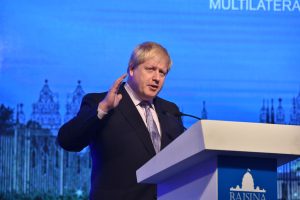Media reports, quoting officials from 10 Downing Street, noted on March 16 that British Prime Minister Boris Johnson will be visiting India at the end of April. Johnson’s visit would come at a time when the U.K. is seeking to recalibrate its strategic footprint and focusing on the Indo-Pacific following its exit from the European Union.
Johnson was scheduled to visit India in January as the chief guest at India’s Republic Day celebrations on the 26th of that month, a trip he had to cancel amid a surge in COVID-19 cases in the U.K. due to a new, mutant, strain of the novel coronavirus.
British minister of state for the Commonwealth, United Nations and South Asia, Tariq Ahmad, is in India at the moment, having already met key Indian officials including External Affairs Minister S. Jaishankar, and Minister of Law and Justice Ravi Shankar Prasad.
News agency Reuters has noted Johnson’s office as stating that the Indo-Pacific “tilt” is part of a new Integrated Review of defense and strategic policy, and that the U.K.’s focus on the region is in recognition of the growing geopolitical importance of the region. The review is scheduled to be released on March 16.
Writing on Britain’s return “east of Suez” after more than half a century, The Guardian’s Diplomatic Editor Patrick Wintour wrote on March 15, “Many foreign ministries from France to Germany have recently produced Indo-Pacific strategies. Self-excluded from the European single market, the post-Brexit U.K. needs new trading waters in which to fish, while at the same time the rise of China requires the U.K. to give a more coherent response than the one offered by ministers so far.”
“If you look at India and the Indo-Pacific region and take a long-term view, that is where the growth opportunities will be,” Wintour quoted British Foreign Secretary Dominic Raab as saying in December last year.
Ever since the referendum to exit the European Union in 2016, India has loomed large in London’s strategic and geoeconomic imagination. Soon after Brexit, in November 2016, then Prime Minister Theresa May visited India, a trip The Hindu described as “underwhelming,” as key differences that have hobbled deeper economic ties between the two could not be resolved. Over the last four years, on the surface India-U.K. relations remain nominally upbeat. But scratch the surface, and old problems persist, and not just around trade and mobility issues.
Domestic affairs of both countries remain considerably interlinked through the large South Asian diaspora in the U.K. They carry the potential to play spoilsport to the best of intentions Number 10 might harbor when it comes to deepening ties with India. Witness, as example, India’s recent annoyance at British parliamentary deliberations on the ongoing farmers’ protests in India.
Reacting to the March 8 debate, the Indian High Commission in London had noted, “We deeply regret that rather than a balanced debate, false assertions without substantiation or facts were made, casting aspersions on the largest functioning democracy in the world and its institutions.” Not just that, the Indian Ministry of External Affairs had also issued a demarche to the British high commissioner about what it described as “unwarranted and tendentious discussion on agricultural reforms in India.”
For British politicians, many of whom have large Sikh as well as Pakistani communities in their constituencies, the British government’s engagement with India remains, fundamentally, a matter of balancing global interests with local electoral imperatives. But it is not just what would be called “vote bank politics” in India that presents complications for India-U.K. ties. Elite opinion about India in the U.K. too remains divided. A January report authored by Robin Niblett, head of the influential think tank Chatham House, on U.K’s post-Brexit strategic future clubbed India with China, Saudi Arabia, and Turkey as potential “rivals or, at best, awkward counterparts,” and pilloried Modi’s domestic policies, leading to much grumbling among New Delhi’s policy class.
Rather reactively, the Indian government has also decided to take the fight, so to speak, to the U.K.
Jaishankar stated on March 15 in the upper house of the Indian parliament that his government would discuss instances of racism in the U.K “with great candor when required.” The minister was reacting to remarks by another member of the ruling Bharatiya Janata Party about an Indian student who resigned from her position as the president of the Oxford University Students Union, as well as a controversial recent interview of actor and former member of the British royal family, Meghan Markle – both of which raised concerns about pervasive racism in the U.K., even in the most elite of institutions in that country.
As Johnson plans his upcoming New Delhi trip, many analysts would closely watch how his government manages to woo India as part of its Indo-Pacific tilt at a time when many of the Modi government’s decisions appear to be unpopular among segments of the British public. To what extent both will manage to accelerate their interests-based engagement in face of obvious push-and-pull about each other’s domestic circumstances remains to be seen.

































